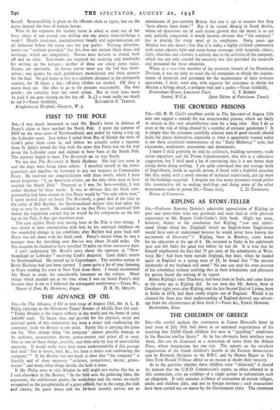KIPLING AS STORY-TELLER
SIR,—Professor Bonamy Dobree's admirable appreciation of Kipling as poet and story-teller wins our gratitude and must lead us with pleasant expectancy to Mr. Rupert Croft-Cooke's little book. Might not some, however, demur at the conclusion that Kipling "saw and under- stood things about her (England) which no English-born Englishman would have seen or understood because he would never have known the excitement of discovery " ? Kipling, born in Bombay, came home for his education at the age of 6. He returned to India in his eighteenth year and left India fof good just before he was 24. It is true that he himself emphasised the fact that 75 per cent, of his schoolmates at West- ward Ho ! had been born outside England, but later, when he landed again in England as a young man of 23, he found that "the ancient landmarks of my boyhood still stood." No one can read his own account of his schooldays without realising that in their tribulations and pleasures his genius found the stirring of its vigour. Before Kipling's time Thackeray had been born in India, and came home at the same age as Kipling did. In our own day Mr. Amery, born at Gorakpur eight years after Kipling, and the late Second Earl of Lytton, born at Simla in 1876, had their cradle origins out of England. Would it be Claimed for them that their understanding of England derived any advant- age from the circumstance of their birth ?—Yours &c., EDWIN HAWARD.
Beckenham, Kent.


































 Previous page
Previous page